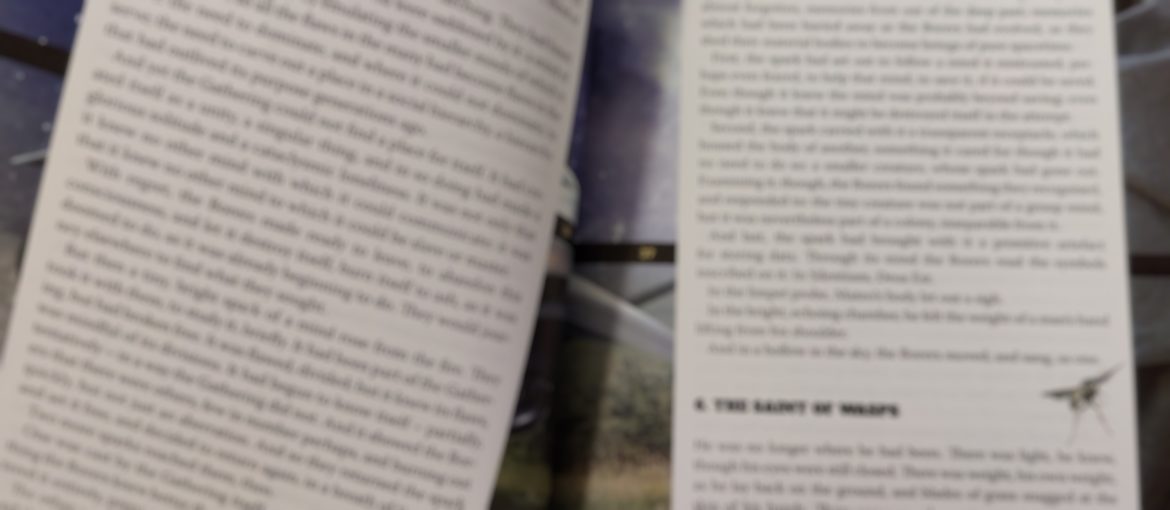This was a periodical sent out by the BSFA for members to review before voting in the 2019 BSFA Awards, although sadly – living overseas as I do – it arrived after the Awards had been awarded.
Becky Chambers, To Be Taught, If Fortunate. A bunch of astronauts travelling through space in suspended animation wake up and we see some glimpses of their characters. The narrator muses on the nature of space travel and the experience thereof, and on the history that has led to their journey, in a missive home that may take fourteen years to arrive. It concludes with an underdeveloped idea of crowdfunded space travel, born of frustration with, one supposes, states and private industry, though one wonders who administered and utilised the crowdfunds to make all this happen, and what infrastructure all that rested upon?
The conclusion that the narrator’s journey is the result of “a fragile endeavour that can only stand thanks to the contributions of many” is momentarily stirring, but I can’t say I found the idea of people donating to an Escape To Space, I Don’t Want To Live On This Planet Any More patreon a bit lacking in substance. There’s so little of the concept presented here that it feels like clicktivism, where some people threw what money they could at a problem and somehow money was magically transformed into a space program.
So: I didn’t care for what was in the magazine I was sent. But then I realised it’s about 6 pages of a 136 page novella. Ohhhh. The contents page does identify it as an extract, but the text itself doesn’t. Well, I’ve not read Chambers’ work since her debut, so perhaps I should – although not on the strength of this excerpt, which doesn’t work as a standalone at all.
Fiona Moore, Jolene. I greatly enjoyed this story when I originally read it and I still liked it a lot on re-reading. See my original thoughts in my review of Interzone #283.
Gareth Powell, Ragged Alice. Another excerpt, thought fortunately I was already aware of what Ragged Alice is so wasn’t taken by surprise this time. This extract does do a solid job of setting up the story and leaving me wanting more, and whilst it also doesn’t completely work as a standalone it does at least function as an episodic slice of something larger, ending on a delicious cliffhanger. Powell also consistently delivers good character work and that talent is on display here.
A side note: this is a contemporary police procedural with supernatural elements, and an extract from a 200-page short novel. Maybe it does fit within the strict definition of a novella but I’m bemused as to why this was up for a BSFA Short Fiction award. I did like it, though.
Tade Thompson, The Survival of Molly Southborne. Another extract from another novella. Did no one read any short stories this year? Is the short story form dead? Are we doomed to only read Amazon.com novellas in future?
I don’t know the answers to such questions, but I do know that the idea of a woman whose spilled blood forms rapidly-growing psychopathic and homicidal clones of herself is a great conceit for a story, and all the more so when the story is told from the point of view of one of those clones.
This also doesn’t work as a standalone and the extract ends a little aimlessly, but the concept alone has me interested in reading more.
Ian Whates, For Your Own Good. Another short story! At last!
Our narrator’s consciousness is segueing between a beautiful and calm Mediterranean environment, and sitting in his car which is clearly malfunctioning. Distressed, he tries to understand what is going on, and eventually engages his car’s AI in dialogue. It explains to him what is happening, and why. The protagonist is, literally, a passenger along for the ride.
It’s a respectable execution of a spin on a hoary SF trope, but the passivity of the story and the unsurprising way it unfolds did not leave me feeling it was among the best British short SF of last year.
Amal Eh-Mohtar and Max Gladstone, This Is How You Lose The Time War. Another extract from a short novel – at 200 pages it’s as long as the novel I’m currently reading, Jeff Vandermeer’s Annihilation – but due to the back-and-forth nature of the story’s structure of letters and vignettes, it works better than most of the others.
There are some striking images here rich with SFnal invention, and the relationship between ‘Red’ and ‘Blue’ is intriguing, although this doesn’t stand alone as anything more than an advertisement for the larger work. As with pretty much all the other ‘novella’ extracts, however, I was left wanting to read more.
This extract, or the book it is from, ultimately won the short fiction category, which I think is a respectable choice, despite my suspicion that a 200 page book is going to run to well past 40,000 words. Ah well. I didn’t nominate or vote in the awards, so why be pedantic? At least I have some more novellas and novels to read now. ;)

